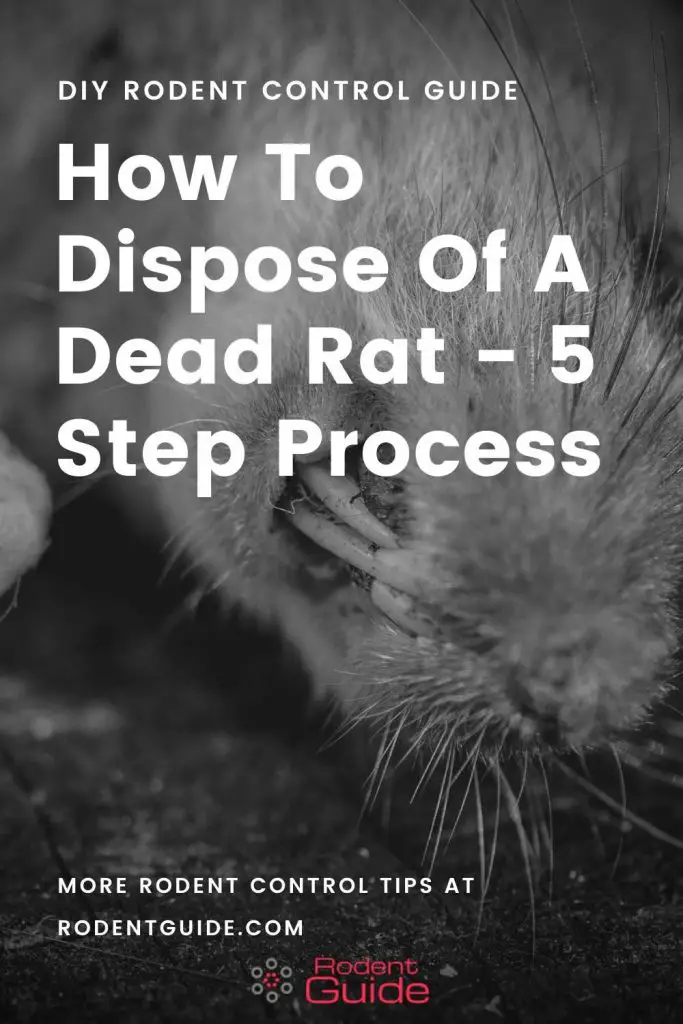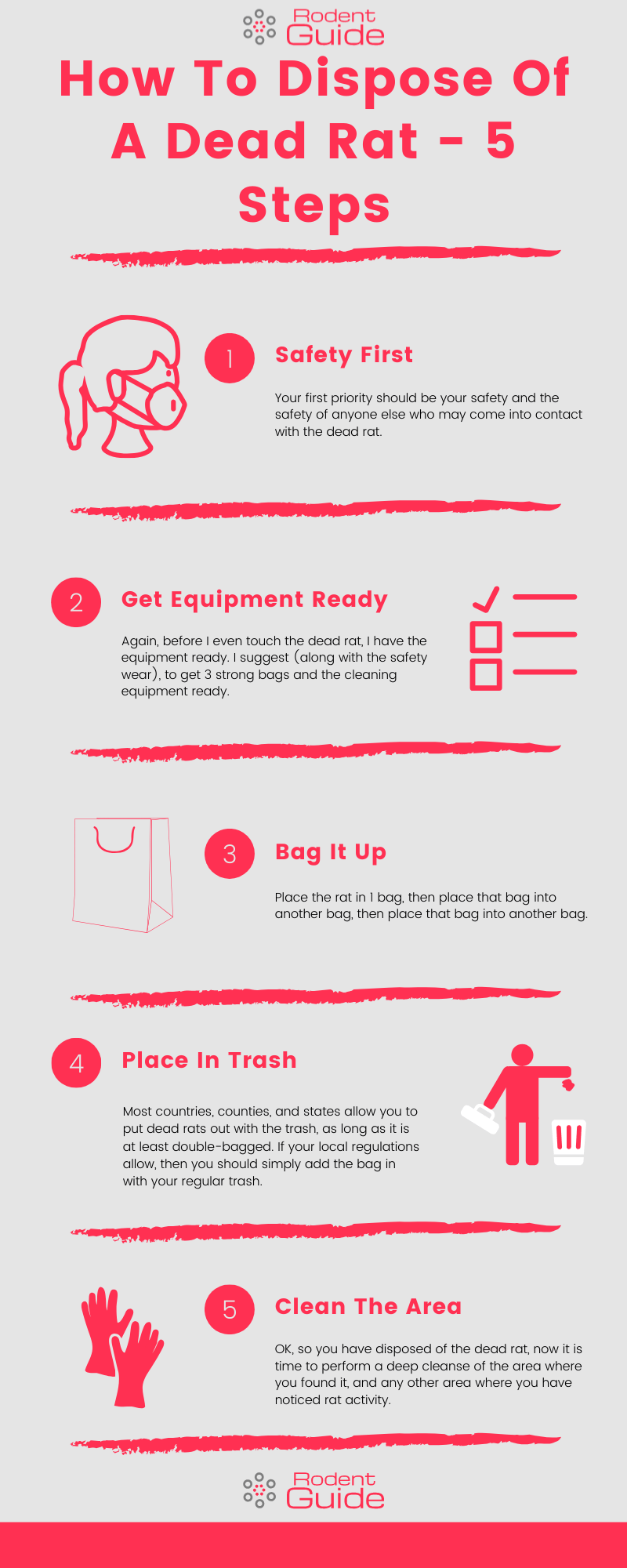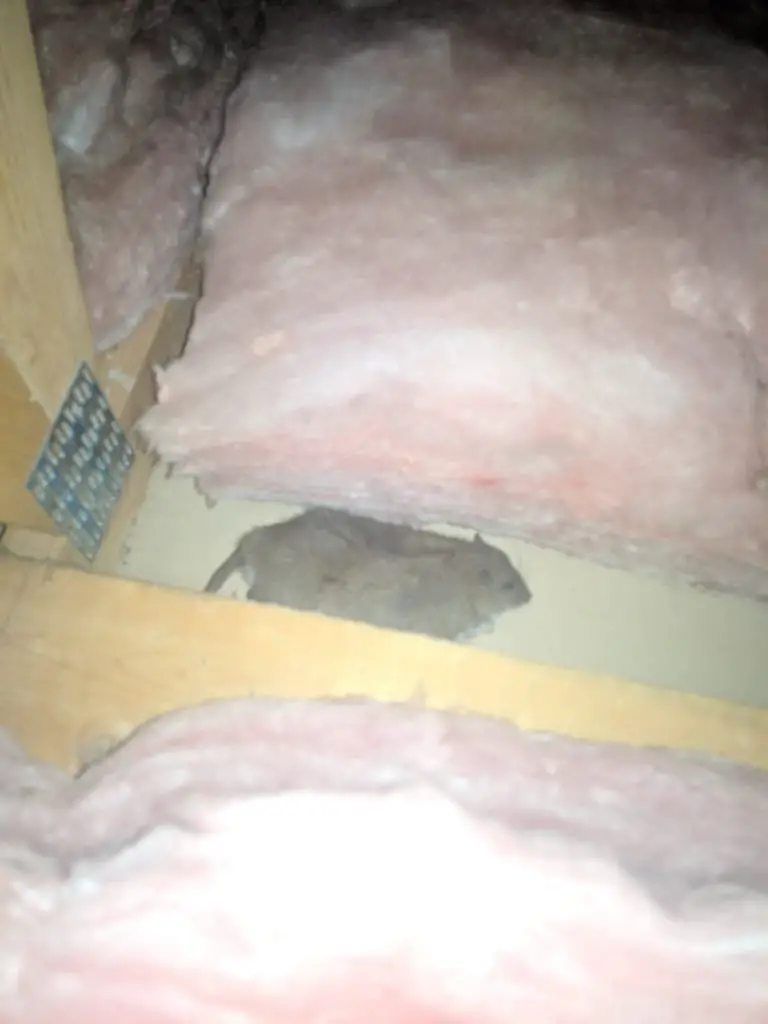The first time I had to get rid of a dead rat was the last step in a long, drawn-out saga that started with me asking, ‘what is that smell?’
The answer to that question was: a dead rat in the attic! At the time, I didn’t know what to do with the carcass. All I knew was that the odor was horrendous, and the maggots also needed to go.
Want to know how to dispose of a dead rat? Then this page is for you!
After all, we know that rats are dangerous, but are they still dangerous after they have died?
What you will learn from this post:
- How to dispose of a dead rat
- Considerations when dealing with a dead rat
- How long does it take for a rat to decompose, and is the odor harmful

The Legalities
For the most part, it is enough to simply double bag (or triple bag like I do) the dead rat before placing it in your regular trash.
However, your country, county, or state regulations may deviate from this advice. Please check with your local public animal control service for more clarity if you are unsure.
How To Dispose Of A Dead Rat – 5 Step Guide
If you are wondering what to do with a dead rat, we have you covered here!
Let’s take a look at dead rat disposal 101.

1. Safety First
Your priority should be your safety and the safety of anyone else who may come into contact with the dead rat.
Before picking up the dead rat, I will wear the following:
- Robust disposable gloves
- Respirator
You must be safe when handling the dead rat.
2. Get Equipment Ready
Again, before I even touch the dead rat, I have the equipment ready. I suggest (along with the safety wear) getting 3 strong bags and the cleaning equipment ready.
Getting the cleaning equipment ready is good because I like to give the area a few sprays of anti-bacterial spray or even bleach (where possible) straight after picking the rat up. Bleach will also help to keep other rats away.
3. Bag It Up
Place the rat in 1 bag, place that bag into another bag, then place that bag into another.
Some folks only double-bag a dead rat, but I prefer to put it inside 3 bags. I urge you to use strong, eco-friendly bags that decompose over time.
4. Place In Trash
Most countries, counties, and states allow you to put dead rats out with the trash, as long as it is at least double-bagged. If your local regulations allow, add the bag to your regular trash.
Check your local regulations. If you think about it, we usually throw away scraps of animal-based food (chicken, beef, etc.). A rat is pretty much the same substance!
5. Clean The Area
OK, so you have disposed of the dead rat; now it is time to perform a deep cleanse of the area where you found it and any other area where you have noticed rat activity.
Use the following:
- Bleach (or natural cleaner of white vinegar and water)
- Anti-bacterial agent
- Strong gloves
- Strong eco-friendly bags
When you have finished, bag up all the disposable equipment you used and dispose of them the same way you did the rat.
That is the last step in understanding how to dispose of a dead rat.
Can I Bury A Pet Rat When It Has Died?
You can bury a pet rat in your yard unless local regulations prohibit it.
When choosing a burial place for the rat, ensure that it is not near a water source and is deep enough so other animals cannot dig it up.
Also – it would be best if you only buried pets on land you own. Do not bury the dead rat on public land or rented land.
Is A Dead Rat Smell Harmful To Health?
Although the odor of a dead rat is pretty bad, it is not toxic to humans.
Although it is not the rat carcass that is harmful to your health, some diseases can be passed through to you when breathing in rat feces or urine if the rat is a carrier of these diseases.
How Long Does It Take For a Rat To Decompose?
Depending on the rat’s temperature and size, a decomposing rat will take up to 5 weeks.
If the weather is hot, the time it takes for a dead rat to decompose will be shorter.
A small rat in a hot climate is going to decompose within 2 weeks. A large rat in a colder climate will take up to 5 weeks, maybe more if it becomes frozen!
How Long Does a Dead Rat Smell Last?
You will start to notice the smell of a dead rat within days of it dying, especially if you live in a warm climate.
The dead rat odor will last as long as it takes to decompose. The smell will continue over 1-2 weeks after fully decomposing because it lingers. The good news is that you can reduce the odor by using scented candles, air fresheners, or odor absorbers.
Do Rats Play Dead? Is It Dead?
Rats freeze if they are scared, but they are not known to play dead. I shone a flashlight at a rat which stopped it in its tracks. It wasn’t playing dead; it was startled.
If you see what you think is a dead rat, it is dead or just about to die. There is no playing where rats are concerned.
Maggots v Dead Rat – The Morbid Relationship
If you want to understand how to dispose of a dead rat, you also need to know how to deal with the maggots that may be feasting upon it!
If a fly gets to the dead rat before you do, it will lay eggs around the carcass! Within 48 hours, the eggs will hatch, and the fly larvae (maggots) will begin to eat the flesh of the dead rat. It’s not the start in life that I would be happy with, but I am not a fly!
Needless to say, you may get maggots in a dead rat.
I mentioned in the intro of this post that I had a dead rat in my attic; well, here is the (slightly grainy) picture of it:

This rat had been dead for around 1 week. It didn’t take long for the odor to get strong enough for me to smell the odor below the attic!
Underneath the dead rat was a collection of maggots feasting on the rat. I didn’t know it at the time of this picture, but I was just about to find out!
Conclusion
Looking for info on how to dispose of a dead rat? In this post, we have you covered.
We covered that topic and advised you on cleaning up the area and answering the growing query about the relationship between dead rats and maggots!
As always, whenever dealing with rats you should consider your health, and the health of others around you.
Finally, now that you have disposed of the dead rat, you should move to stop rats from entering your home in the first place (if the dead rat was in your home).
Find those rat entry points and seal them up! That way, you will no longer need to know how to dispose of a dead rat.
Good luck!








